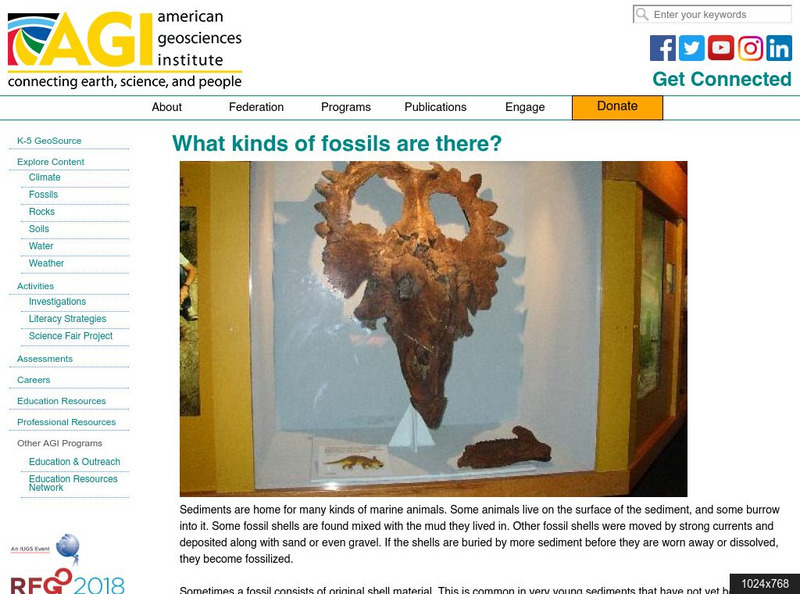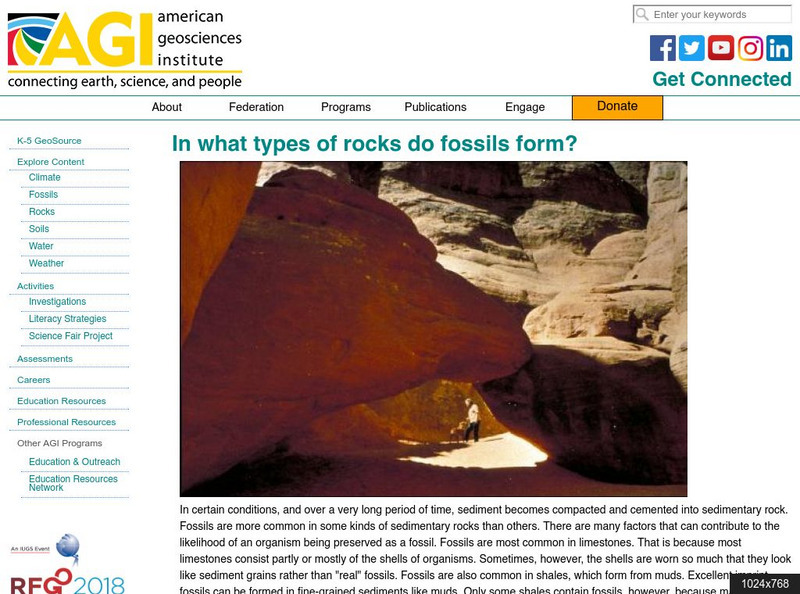Utah Education Network
Uen: Trb 4:4 Investigation 3 Examining Your Fossil
Investigation allows students to draw conclusions about the environment of fossils made previously.
Utah Education Network
Uen: Trb 4:4 Investigation 1 Identify & Compare Fossils
Fourth graders will look at different items to see if they can recognize fossils.
Science Buddies
Science Buddies: Get Some Practice at 'Fossil' Reconstruction With Owl Pellets
Although this project is not based on actual fossils, you will get good practice at reconstructing an animal's skeleton from individual bones. The goal of this science project is to identify the types of prey that are consumed by owls by...
Utah Education Network
Uen: Investigation 2 Simulating Fossil Formation
This lesson plan includes directions for 5 different activities for making a variety of fossil types. The fossils included in all five activities are casts, petrification fossils, imprints and preserved fossils. The labs require a number...
American Geosciences Institute
American Geological Institute: Evolution and the Fossil Record
The American Geological Institute has done an excellent job of defining and explaining evolution in this online booklet. Darwin, fossils, natural selection, and change over time are some of the concepts that are covered. Make sure to see...
American Geosciences Institute
American Geosciences Institute: What Kinds of Fossils Are There?
Learn about the different types of fossils that formed millions of years ago.
CK-12 Foundation
Ck 12: Earth Science: Types of Fossilization Study Guide
[Free Registration/Login may be required to access all resource tools.] This study guide summarizes key points about how fossils form. Includes one study question.
Science Struck
Science Struck: Types of Fossils
Describes four different kinds of fossils and how they form.
American Geosciences Institute
American Geosciences Institute: In What Types of Rocks Do Fossils Form?
Learn about the types of rocks where fossils can form.
US Department of Energy
U.s. Department of Energy: Coal: Our Most Abundant Fuel
The U.S. has enough coal to last for the next 200-300 years. So why are we not using more of it? This article describes the different types or "ranks" of coal, the history, and the problems with burning coal for energy.
Science Buddies
Science Buddies: Sorting Out Sedimentation
Sedimentary rock forms in layers that are deposited one after the other over long periods of time. Oftentimes, sedimentary rock contains fossils and other debris that are deposited within the layers. Use this experiment to investigate...
PBS
Pbs: Where to Dig
Dinosaurs have intrigued us for many years. As we explore to learn more we need to know where to look. In which type of rock would you find dinosaur fossils? This brief interactive provides real world application for rock characterization.
Other
New Jersey Fossils: Duckbilled Dinosaur
The duckbilled dinosaur was a type of hadrosaurus and existed in New Jersey in the Late Cretaceous Period. A few fossil specimens have been found in areas of New Jersey, with the very first partial skeleton being discovered in...
University of Oregon
Museum of Natural and Cultural History: Rocks and Minerals: Everyday Uses
Click on the shelves in this virtual exhibition to learn about the many rocks and minerals that we use in our everyday lives.
BBC
Bbc Nature: Prehistoric Life: Triassic Period
Overview of the Earth in the Triassic Period as told by photos, news, and external links with an emphasis on what grew then, what lived then, the causes of mass extinction, types of fossils, and what life was like in general.
BBC
Bbc Nature: Prehistoric Life: Cretaceous Period
Overview of the Earth in the Cretaceous Period told by photos, news, and external links with an emphasis on what grew and lived then, the causes of mass extinction, types of fossils, and what life was like in general.
CPALMS
Florida State University Cpalms: Florida Students: Evolution: Examining the Evidence
Strengthen understanding of how different types of scientific evidence support the theory of evolution, including direct observation, fossils, DNA, biogeography, and comparative anatomy and embryology.












